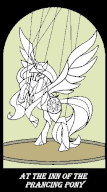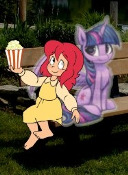Luna's Reviews: Doctor Who: Survival, Part Three--How to Survive the End of the World · 6:09am Sep 16th, 2014
Before I get into the last episode of Survival, I suppose I should warn you. Andrew Cartmel takes himself very seriously. It’s very easy to look at all of this, and choose to laugh at its utter pretentiousness. It was probably just a good a reason to abandon the series as any other. But I’m going to act like all of this is very serious indeed.
So do try to restrain your chortles until the end. I’ll even help you out by starting with some serious analysis before getting back to the stuff about teleporting animatronic cats and people in adorable cheetah fursuits that are supposed to be intimidating.
There was at least one other group of dedicated fans in the dying days of the series beside the obsessed young men I have been following. As Doctor Who was an outsider show, with a cast of outsiders, so it gained a following of those who were outsiders themselves. Many of these would become the primary authors of the Wilderness Years, and some of them would be responsible for the Revival in 2005.
The interpretations were there, if you wanted to look for them. In most cases, they were never intended by those making the serials, but this was a forbidden culture, well-practiced in disguising themselves as “normal”, and in using double meanings to communicate with their own kind even when in mixed company.
Ace was a strong-willed young woman whose one romance scene with a man was completely unbelievable, and whose only strong friendships besides the Doctor were all women of her own age. You can probably guess the inferences that many have made from these observations. Survival, perhaps more than any other of Ace’s appearances, really pushes for this interpretation. Through the metaphor of the hunt, she is discovering her strength as a woman for the first time, and her guide is yet another woman: Karra, who at one point must have been human. In Survival, Karra was voiced by Lisa Bowerman. In the world of Doctor Who, Bowerman is best known for playing the character of Bernice Summerfield.
Bernice Summerfield was the most popular of the Seventh Doctor’s companions in the Virgin New Adventures after the corruption of Ace. She was a wise-cracking archeologist from the future and yes, Steven Moffat did pretty much steal her personality and occupation wholesale when creating the character of River Song for the Revived series. (3)
In 1996, with the coming broadcast of the TV movie, the BBC took back the publication rights to Doctor Who from Virgin Publishing, and began their own series of books. Unfortunately, the financing deal necessary to create a new Doctor Who series on television fell apart, and the new book series also was rejected by many readers for not being dark and gritty enough, and for lacking a strategic vision like the Virgin books had. Virgin, seeing this opportunity, put out a new series of novels centered around one character they had 100% ownership of: Bernice Summerfield. The novels contained all sorts of wonderful concepts that were just this side of copyright infringement territory. In contrast to the BBC, this series actually managed to do quite well.
At this moment, a new company called Big Finish Productions approached Virgin for the right to create audio plays based on the Summerfield books, and they hired Lisa Bowerman to play her. The audio adventures did even better than the novels did, as this was the era when audio plays in general were becoming huge. The BBC took notice, and despite having one of the best radio teams in the world, gave Big Finish the contract to make audio plays about Doctor Who, including stories starring past Doctors. And so Bernice Summerfield was responsible for the continued employment of Peter Davison, Colin Baker, Sylvester McCoy and even poor Paul McGann, the Eighth Doctor and star of the TV movie who never got a proper series of his own. Big Finish is still making Doctor Who audio plays even today, the only part of the Wilderness Years to have survived into the present.
The Doctor tries to get Ace to help them return to Earth, but Karra lures her away for a hunt.
Back on Earth, the Master looks into a mirror and wills his animal features to disappear. Beside him, Midge has completely surrendered himself to his darker nature.
MASTER
Ah. You are all animal now. You're so weak,
your will devoured. A stronger mind will
hold on itself longer, a will as strong as mine.
How much longer? If I have to suffer this
contamination, this humiliation, if I am to
become an animal, then like an animal I will
destroy you, Doctor. I will hunt you, trap
you, and destroy you.
He easily asserts his control over Midge.
On another world, Ace briefly comes to her senses, but Karra, calling her “sister”, easily pulls her back in:
KARRA
Are you hungry? The chase.ACE
What?KARRA
The hunt. Smell the blood on the wind. Hear
the blood in your ears. Run, run beyond the
horizon and catch your hunger!
She howls, and two horses run to them, eager to hunt as well. (There are temptations here for more than just the humans watching this program.)
KARRA
Are you hungry, sister? Come hunting.
The Doctor catches up with Ace. He tells her what is going on, tells her that if she chooses to surrender herself enough to take them back to Earth that she may never regain her humanity, and then leaves the choice up to her. With a feral grin, she shifts her eyes, and brings the Doctor and the humans back home. To Earth, yes, but more specifically to just outside the TARDIS. But travelling with the TARDIS is its own kind of hunt, a never-ending hunt for adventure that requires a human mind rather than that of a cheetah’s. And so Ace becomes human again.
Paterson walks away, already convincing himself that the whole thing was a hallucination, and that some of the Doctor’s prescriptions must have been at fault.
The Doctor and Ace begin tracking down the Master and Midge. At Midge’s flat, they discover his traumatized sister and the corpse of the pet cat. At the Youth Center, they discover the corpse of Paterson—the test of the “survival of the fittest” was finally applied to him, and abandoned by his traumatized students, he failed the test. Then the Master turns the students.
The Doctor and the Master meet on a hill. Midge is on a motorcycle, armed with the sabre tooth. A second cycle awaits. Ace tries to board it, her eyes turning yellow, but the Doctor stops her, telling her if she fights she will lose herself forever. So instead he gets on the bike.
(Sylvester McCoy on a motorbike is one of the silliest things in the entire series, and I am counting Ingrid Pitt attempting to judo-chop the Myrka in Warriors of the Deep. Despite this obvious fact, the show has him do this not once, but twice. I guess you just couldn’t be a legitimate hero in the 1980s without riding a chopper.)
The two motorcycles joust, ending in a tremendous explosion (as these things tend to do); the Doctor appears to have died, but not before clearly defeating Midge. In disgust, the Master orders his servant to die, and he does. The students surround Ace. She cannot fight, and calls for help.
Karra on her horse materializes in a flash of light. The Master orders her to dismount, and she is forced to obey. He tries to assert his complete control over her, but she resists, so he stabs her to death with the sabre tooth. Karra turns briefly into Lisa Bowerman before dying in Ace’s arms, her last words “Good hunting, sister.”
The Master walks over to the TARDIS, and tries to break in, but is stopped by the Doctor. The Master proclaims that this will be the end of their never-ending confrontations, because he has mastered the power of the Cheetah Planet. With a flash, he transports them both back there.
The planet is collapsing to the force of (stock footage) volcanoes all around them. The Doctor’s eyes go feline, but he still urges the Master to help him escape.
MASTER
Escape to what? I don’t choose to live
like an animal.DOCTOR
If we fight, we’ll destroy this planet. We’ll
destroy ourselves.MASTER
(while CHOKING the DOCTOR)
You should have killed me, Doctor.DOCTOR
If we fight like animals, we die like animals!
Somehow, this statement, and the decision not to fight back, is enough to bring him back to Earth. The Master presumably died on the Cheetah Planet. (Until the TV movie came around, and proved otherwise.)
There is a brief moment that is perhaps lost on most viewers. What with the duel, and the explosion. and the Doctor’s disappearance, it appears to Ace that her mentor has died, as she finds his hat and trademark umbrella on the ground. She’s back in her hometown, in her own time, so she could have walked away, like so many other companions left behind by the Doctor. Instead she puts on his hat. I see this moment as a sort of exit window for the imaginative fan: the Doctor has died with the series, but that doesn’t mean that Ace, or the fan, has to give up. She could have walked up to that TARDIS, gone in, and continued off to her own adventures. Snuck out the back door of the series, like Bernice Summerfield snuck out the back door of her series. So goes the fantasy.
In the actual episode, the Doctor stops Ace before she can put on that hat. They look around, and see that all those who have surrendered themselves to their inner cheetah have disappeared—to continue the hunt forever, perhaps. The same hunt that will never disappear from Ace’s heart.
DOCTOR
Where to now, Ace?ACE
Home.DOCTOR
Home?ACE
The TARDIS.DOCTOR
Yes, the TARDIS. There are worlds out there
where the sky is burning, where the sea's
asleep, and the rivers dream. People made
of smoke, and cities made of song.
Somewhere there's danger, somewhere
there's injustice, and somewhere else the
tea's getting cold. Come on, Ace, we've got
work to do!
Doctor Who ended on December 6, 1989. But it will never die, and that statement would have been just as true in a universe with no Revival, no Big Finish, no TV movie, no Virgin New Adventures. Even if the Wilderness Years never ended, there would still be a Doctor Who, as long as anybody is around to make up new adventures in their head for the Doctor.
And so may it be for your favorite series.
Footnotes by McPoodle:
3) Well, Moffat did come up with the timey-wimey bit.






STAHP!!
Too many blog posts at once!
2458844
Well it was either that, or ask you to read all 6000 words of this essay in one indigestible chunk.
2458847 Challenge accepted! 6,000 words is nothing... a bit much for a simple review/analysis but still easy as pie.
Certainly an interesting take on the series and I must say I also think children are evil, likely for different reasons.
Not having watched enough of the classic series myself, I can't give my own opinion on the series as a whole or Survival in particualr. But this was nonetheless a very interesting analysis.
If I may ask, how well do you think the revival series has addressed the central criticisms of these blogs, such as the static characters or the silly schemes?
Well down Princess. Very well put together.
This also is a good thing to remind ourselves of, once FiM is taken off the air at some point in the future... it'll never end as long as we invent stories!
I'm glad to see the positive reaction to a rank amateur's attempt to break into the vaunted heights of Who fandom. You'll note, however, that I didn't dare submit this essay to an actual DW fansite.
I have the distinct feeling that there is something...extra in this piece, something perhaps more than what I know, or feel, or what I should know or feel about this series. It bears some further thought.
I believe Mr. McPoodle would be better able to respond to the following comments than I, so I shall take my leave.
2459745
(Luna hasn't seen the entire Revived series yet (or the TV movie). I hope to persuade her to do so in the near future, but for now I'll bore you with my opinion instead.)
The Revival handles character development much, much better than the Classic series. But it still has a long way to go. The two best cases would be Mickey (who's development tends to be overlooked by watchers too focused on the main characters), and Donna (who's character started out so obnoxious that a sizable portion of the viewers absolutely refused to give her any sympathy whatsoever).
As for silly episodes, this is a family show. What that usually means is that there's always a colorful two-parter smack dab in the middle of each season that's completely for the kids--fart jokes and all. And to balance that out, there's at least two really deep episodes written for the adults--usually written by Steven Moffat before he took over. The rest of the episodes range between dull and fun to watch.
I still hold that City of Death (1979) is one of the finest bits of television I have ever watched. But "Blink" (2007) is pretty darn close.
2459913
Well, I'm going to keep writing as long as I have good ideas, show or no show.
I have a feeling that this essay has some sort of point beyond just analyzing Dr. Who...
What could it possibly be.... /s
Always an enjoyable read, Princess!